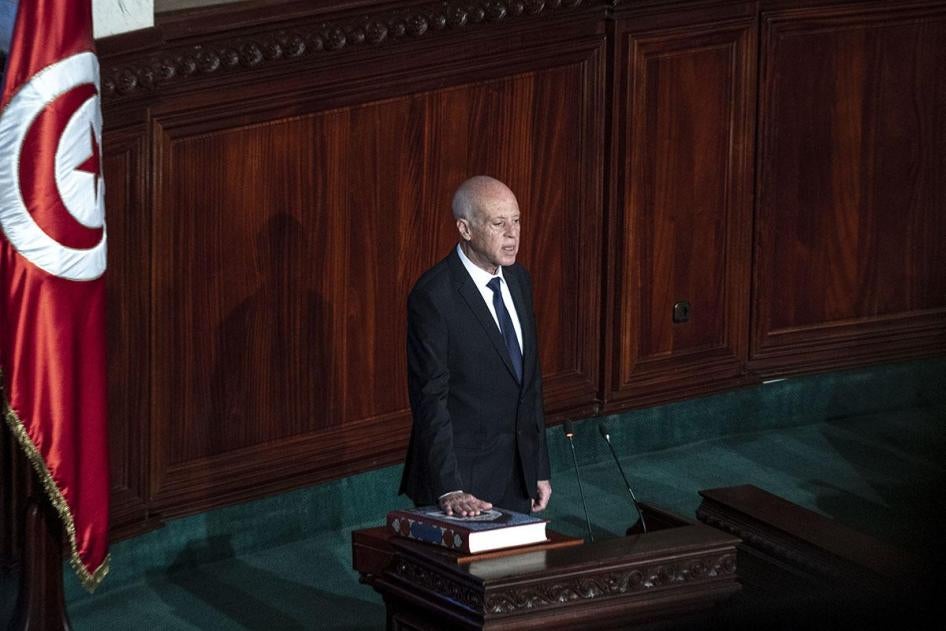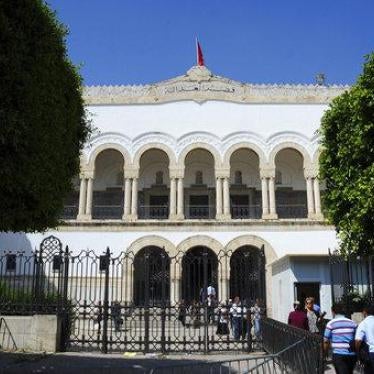It’s been a year since President Kais Saied of Tunisia fired 57 judges and prosecutors, accusing them of financial and “moral” corruption and obstructing investigations. That day, Saied issued a decree-law empowering the president to fire judges, virtually eliminating any pretense of the separation of powers.
These were among the most audacious moves of the ongoing power grab that Saied began on 25 July 2021, when he suspended parliament and said he was taking over supervision of the prosecutor's office. To justify his concentration of power, Saied has charged that the governments that followed the 2011 revolution and in which the Ennahda party played a key role, were corrupt and lax toward terrorism – if not complicit in it.
Abdesettar Khlifi, 58 and a father of four, who had a 28-year career as a judge and prosecutor, was among those fired on 1 June 2022. Although authorities accused the judges of wrongdoing, they gave them six months of severance pay before terminating their salary, their status as civil servants and the benefits that came with it, including medical coverage. At least some have been barred from travelling abroad. Two of them have been in prison since 12 February, including Bechir Akremi, who faces dubious charges relating to his handling of terrorism cases when he was chief prosecutor of Tunis.
The government never provided Khlifi or his colleagues with a hearing or any official explanation for their sacking, not even when they appealed to the administrative court of Tunis, which on 9 August 2022, ordered the government to reinstate the 49 who at the time were facing no charges of any kind. The government ignored the court order even though it is not subject to appeal. In January, the fired judges filed a complaint in court against the justice minister for noncompliance with a judicial ruling, under Penal Code article 315.
The court has yet to respond. Instead of complying with the court order to rehire the judges, the Justice Ministry announced the opening of scores of criminal investigations against them, including terrorism-related accusations against 13, among them Khlifi. Prosecutors have also gone after lawyers defending the fired magistrates, like Ayachi Hammami, who was subpoenaed on accusations of spreading “false information” under Saied’s repressive decree-law 54 of 2022.
“They fired the judges in order to intimidate the ones who managed to keep their jobs,” another dismissed judge, Hichem Ben Khaled, told Human Rights Watch (HRW). “The purpose was to have a judiciary that could be used to settle scores with Kais Saied’s opponents.”
That score-settling included the round-up, mostly in February and March, of about 30 opponents and critics of the president, whose pre-trial detention was approved by judges who were presented with little evidence to incriminate them. Saied referred to those arrested, without naming them, as “terrorists” and “traitors” and warned, in an apparent threat to judges, that “whoever dares to exonerate them is their accomplice.”
Most of the 30 have now been behind bars for three months or longer without having a substantive hearing.
On 4 March, the Association of Tunisian Magistrate denounced “considerable and unprecedented pressure on the judiciary system as well as the threatening and intimidating of the judges” handling these cases.
Khlifi told HRW that the terrorism accusations against him stem from his purchase of a used car from a merchant who had made donations to a Quranic school that was accused of indoctrinating and abusing children. A prosecutor questioned him about the purchase in 2019 but never charged him; that file has now been reactivated.
Before these cases can proceed, Tunisia's Provisional High Judicial Council (PHJC) must decide whether to lift the judges’ immunity. Saied created the PHJC in February 2022 after he dissolved the High Judicial Council (HJC), which the Constitution of 2014 had tasked with protecting judicial independence in the appointment, transfer and disciplining of judges. Whereas most members of the HJC were elected, all 21 PJHC members are appointed, nine of them directly by the president.
Amid the gloomy news of political arrests and courts under pressure, civil society activists were energised by the huge turnout and impassioned speeches at a conference on 20 May in Tunis to defend judicial independence. The speakers included Margaret Satterthwaite, the UN special rapporteur on the independence of judges and lawyers, who addressed the gathering via video link because Tunisian authorities had postponed the country visit she had scheduled for that week.
The current threat to judicial independence has overshadowed the fact that it was hardly robust before Saied moved to snuff it out. Long subservient to the executive, judges faced new obstacles in the post-revolutionary period. In 2012, Justice Minister Noureddine Bhiri of the Ennahda party arbitrarily and summarily dismissed 75 judges, accusing them of corruption, and then defied an administrative court order to reinstate them. (They eventually got their jobs back. Bhiri is among at least 14 Ennahda leaders and members who have been jailed since December).
Judicial independence would have been boosted by a constitutional court – but that body never came into existence due to a stalemate in parliament over choosing its share of the court’s members. The 2014 constitution envisioned it as a strong and independent constitutional body able to strike down laws and presidential and parliamentary actions it deemed unconstitutional.
Saied largely suspended the 2014 constitution in September 2021 and pushed through a new, hyper-presidential constitution in 2022 that vastly increased presidential powers and weakened judicial independence, including for the constitutional court.
“To be honest, none of the governments post-revolution had a vision for reforming the judicial system; they all sought to dominate it,” Khlifi told HRW. “But what they did was nothing compared to what the current government is doing.”
Abdelouahab Maatar, lawyer in Sfax who has been pleading cases in court since 1983, observed:
“Under presidents [Habib] Bourguiba [who served until 1987] and Ben Ali, there was simply no conception of the judiciary as an independent power: the president had his judges who would take orders on what verdict to pronounce, especially in political cases. The revolution led to a change of mentality and to a constitution that enshrined judicial independence. This did not bring about a total change, but it stirred hope and gave me, as a lawyer, greater trust in the courts. But since July 25, 2021, that progress has been wiped out.”









